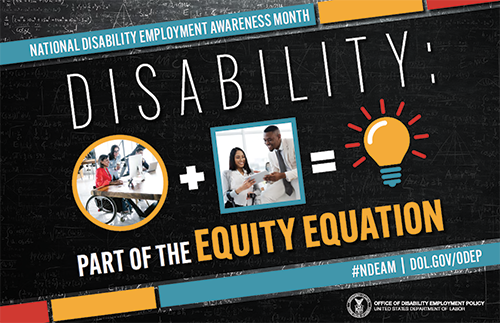Observed annually each October, National Disability Employment Awareness Month (NDEAM) "celebrates the contributions of America's workers with disabilities past and present and showcases supportive, inclusive employment policies and practices."
The theme for NDEAM 2022 is "Disability: Part of the Equity Equation."

NDEAM is led by the United States Department of Labor's (USDOL) Office of Disability Employment Policy, "but its true spirit lies in the many observances held at the grassroots level across the nation each year. Employers of all sizes and in all industries are encouraged to participate in NDEAM." Its purpose is to educate about disability employment issues and also celebrate the contributions of America's workers with disabilities. Disability inclusion is part of creating a diverse, inclusive, and equitable workplace culture.
The USDOL News Release can be found here: https://www.dol.gov/newsroom/releases/odep/odep20220622
The Americans with Disabilities Act (ADA) was signed into law by President George Herbert Walker Bush on July 26, 1990, over 30 years ago. USDOL writes, "As a result of this landmark legislation, communities and workplaces across the nation have become more inclusive and welcoming for America's nearly 40 million people with disabilities."
The ADA applies to all employers (including state and local governments) who employ 15 or more employees. The Equal Employment Opportunity Commission (EEOC) is the federal agency tasked with regulating, among other things, the ADA. The EEOC explains that the ADA "prohibits private employers, state and local governments, employment agencies and labor unions from discriminating against qualified individuals with disabilities in job application procedures, hiring, firing, advancement, compensation, job training, and other terms, conditions, and privileges of employment."
Under the ADA, an individual with a disability is one who:
- Has a physical or mental impairment that substantially limits one or more major life activities;
- Has a record of such an impairment; or
- Is regarded as having such an impairment.
A qualified employee or applicant with a disability is one "who, with or without reasonable accommodation, can perform the essential functions of their job." According to the EEOC, reasonable accommodations in some circumstances can include making existing employee facilities accessible to employees with disabilities or modifying employee work schedules. However, for an accommodation to be reasonable, it cannot cause undue hardship to the employer. "Undue hardship" is defined by the EEOC as "an action requiring significant difficulty or expense when considered in light of factors such as the employer's size, financial resources, and the nature and structure of its operations." Once a reasonable accommodation is requested, the employer and employee should engage in an interactive discussion to talk about the employee's needs or limitations and potential reasonable accommodations.
Ward and Smith, P.A.'s labor and employment attorneys routinely advise business owner clients regarding their obligations under the ADA and assist these clients in participating in the ADA interactive process with their employees, developing reasonable accommodations when possible, and otherwise advise firm clients on the ADA's interactions with other employment leave laws such as the Family and Medical Leave Act (FMLA) and North Carolina Workers' Compensation Act.
Ward and Smith celebrates National Disability Employment Awareness Month this October as part of our ongoing efforts to move beyond compliance-based thinking to foster a diverse, inclusive and equitable workplace culture. We encourage our employees to reach out to Human Resources if they have any questions about the ADA or NDEAM this year.








